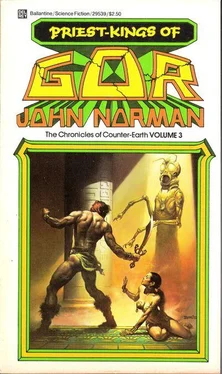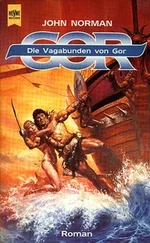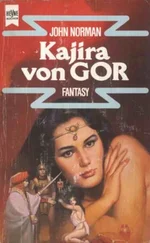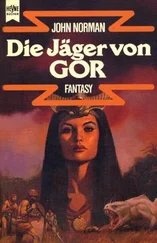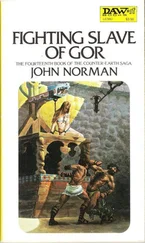“Of course,” said Torm, “after all a Priest-King is only a Priest-King.” He rubbed his nose meditatively. “Of course,” he admitted, “that is quite a bit to be.” He looked up at me. “Yes,” he said, “I suppose that I am brave.” He looked at the Older Tarl. “You must not tell other members of the Caste of Scribes,” he cautioned.
I smiled to myself. How clearly Torm wished to keep caste lines and virtues demarcated.
“I will tell everyone,” said the Older Tarl kindly, “that you are the bravest of the Caste of Scribes.”
“Well,” said Torm, “thus qualified, perhaps the information will do no harm.”
I looked at my father. “Do you suppose Talena is here?” I asked.
“I doubt it,” he said.
I knew how dangerous it would be for a woman to travel unattended on Gor.
“Forgive me, Vika,” I said, and introduced her to my father, to the Older Tarl and Torm, the Scribe, and explained briefly as I could what had befallen us in the Sardar.
My father, the Older Tarl and Torm listened amazed to my account of the truths of the Sardar.
When I had finished I looked at them, to see if they believed me.
“Yes,” said my father, “I believe you.”
“And I,” said the Older Tarl.
“Well,” said Torm, thoughtfully, for it did not behove a member of his caste to volunteer an opinion too rapidly on any matter, “it does not contradict any text with which I am familiar.”
I laughed and seized the little fellow by the robes of his caste and swung him about.
“Do you believe me?” I asked.
I swung him about by the hood of his garment twice more.
“Yes!” he cried. “I do! I do!”
I set him down.
“But are you sure?” he asked.
I reached for him again and he leaped backwards.
“I was just curious,” he said. “After all,” he muttered, “it is not written down in a text.”
This time the Older Tarl lifted him up by the scruff of his robes and held him dangling, kicking, a foot from the ground. “I believe him!” cried Torm. “I believe him!”
Once safely down Torm came over to me and reached up and touched my shoulder.
“I believed you,” he said.
“I know,” I said, and gave his sandy-haired head a rough shake. He was, after all, a Scribe, and had the properties of his caste to observe.
“But,” said Matthew Cabot, “I think it would be wise to speak little of these matters.”
All of us agreed to this.
I looked at my father. “I am sorry.” I said, “That Ko-ro-ba was destroyed.”
My father laughed. “Ko-ro-ba was not destroyed,” he said.
I was puzzled, for I myself had looked upon the valley of Ko-ro-ba and had seen that the city had vanished.
“Here,” said my father, reaching into a leather sack that he wore slung about his shoulder, “is Ko-ro-ba,” and he drew forth the small, flat Home Stone of the city, in which Gorean custom invests the meaning, the significance, the reality of a city itself. “Ko-ro-ba cannot be destroyed,” said my father, “for its Home Stone has not perished!”
My father had taken the Stone from the City before it had been destroyed. For years he had carried it on his own person.
I took the small stone in my hands and kissed it, for it was the Home Stone of the city to which I had pledged my sword, where I had ridden my first tarn, where I had met my father after an interval of more than twenty years, where I had found new friends, and to which I had taken Talena, my love, the daughter of Marlenus, once Ubar of Ar, as my Free Companion.
“And here, too is Ko-ro-ba,” I said, pointing to the proud giant, the Older Tarl, and the tiny, sandy-haired scribe, Torm.
“Yes,” said my father, “here too is Ko-ro-ba, not only in the particles of its Home Stone, but in the hearts of its men.”
And we four men of Ko-ro-ba clasped hands.
“I understand,” said my father, “from what you have told us, that now once more a stone may stand upon a stone, that two men of Ko-ro-ba may once again stand side by side.”
“Yes,” I said, “that is true.”
My father and the Older Tarl and Torm exchanged glances. “Good,” said my father, “for we have a city to rebuild.”
“How will we find others of Ko-ro-ba?” I asked.
“The word will spread,” said my father, “and they will come in twos and threes from all corners of Gor, singing each carrying a stone to add to the walls and cylinders of their city.”
“I am glad,” I said.
I felt Vika’s hand on my arm. “I know what you must do, Cabot,” she said. “And it is what I want you to do.”
I looked down at the girl from Treve. She knew that I must search out Talena, spend my life need be in the quest for she whom of all women I had chosen for my Free Companion.
I took her in my arms and she sobbed. “I must lose all,” she wept. “All!”
“Do you wish me to stay with you?” I asked.
She shook the tears from her eyes. “No,” she said. “Seek the girl you love.”
“What will you do?” I asked.
“There is nothing for me,” said Vika. “Nothing.”
“You may return to Ko-ro-ba, I said. “My father and Tarl, the Master-of-Arms, are two of the finest swords on Gor.”
“No,” she said, “for in your city I would think only of you and if you should return there with your love, then what should I do?” she shook with emotion. “How strong do you think I am, dear Cabot?” she asked.
“I have friends in Ar,” I said, “even Kazrak, the Administrator of the City. You can find a home there.”
“I shall return to Treve,” said Vika. “I shall continue there the work of a physician from Treve. I know much of his craft and I shall learn more.”
“In Treve,” I said, “you might be ordered slain by members of he cast of Initiates.”
She looked up.
“Go to Ar,” I said. “You will be safe there,” And I added, “And I think it will be a better city for you than Treve.”
“Yes Cabot,” she said, “you are right. It would be hard to live now in Treve.”
I was pleased that she would go to Ar, where she, though a woman, might learn the craft of medicine under masters appointed by Kazrak, where she might found a new life for herself far from warlike, plundering Treve, where she might work as befitted the daughter of a skilled, courageous father, where she might perhaps forget a simple warrior of Ko-ro-ba.
“It is only Cabot,” she said, “because I love you so much that I do not fight to keep you.”
“I know,” I said, holding her head to my shoulder.
She laughed. “If I loved you only a little less,” she said, “I would find Talena of Ar myself and thrust a dagger into her heart.”
I kissed her.
“Perhaps some day,” she said, “I will find a Free Companion such as you.”
“Few,” I said, “would be worthy of Vika of Treve.”
She burst into tears and would have clung to me but I handed her gently into the arms of my father.
“I will see that she gets to Ar safely,” he said.
“Cabot!” cried Vika and broke away from him and hurled herself into my arms weeping.
I held her and kissed her again, gently, tenderly, and then wiped the tears from her eyes.
She straightened herself.
“I wish you well, Cabot,” she said.
“And I,” I said, “wish you well, Vika, my girl of Treve.”
She smiled and turned away and my father gently put his arm about her shoulder and led her away.
For some unaccountable reason tears had formed in my own eyes, though I was a Warrior.
“She was very beautiful,” said the Older Tarl.
“Yes,” I said, “she was very beautiful.” I wiped the back of my hand across my eyes.
“But,” said the Older Tarl, “you are a Warrior.”
Читать дальше
